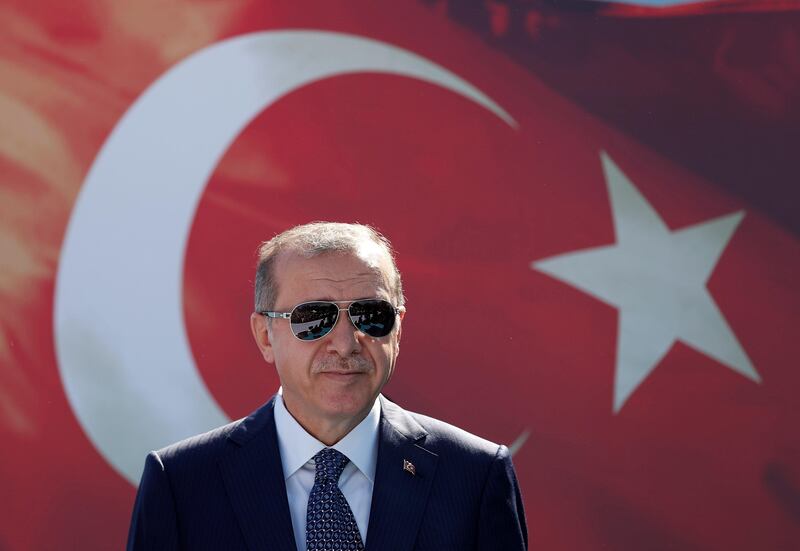Turkish President Tayyip Erdogan is encouraging businesses to borrow and spend to power the economic growth that has underpinned his long rule.
But after years of expanding credit, some Turks are wary.
The Ankara hardware store owner Nurgul said she and her husband have never taken out a loan for their joint business and she is suspicious of banks. "I think they want more people in debt," she said. "I've borrowed for my mortgage and that left me with an excessive amount of debt."
The president, who has purged the civil service of suspected opponents since an attempted coup last year and is expected to run for re-election in 2019, shares her mistrust. He dubs interest rates "means of exploitation" and has declared himself their enemy.
Since winning a narrow victory in a referendum in April to create a powerful new executive presidency, he has had Turkey's banks in his sights, calling on them to cut interest rates to contribute to the country's growth.
"We will pressure the banks, especially state banks," he said last week. "We will pave the way for investors to access credit easily."
Government stimulus measures include expanding a credit guarantee fund, guaranteeing some of the loans banks write to smaller businesses. It has backed loans worth US$60 billion so far.
Bank loans grew by 12 per cent in the first seven months of this year, almost double the rate in same period last year, according to regulatory data, a trend some economists say is worrying.
Turkey has had one of the largest private credit expansions of any emerging market over the last decade, said William Jackson of Capital Economics in London.
"Typically when you get credit booms on that scale, they are followed by a rise in non-performing loans and strains in the banking sector," he said. "It's hard to say when those might emerge, but I think it's clearly a big risk."
Non-performing loans are at 3.1 per cent after 3.2 per cent last year. Cemil Ertem, chief economy adviser to the president, said he expected the ratio to fall to 2 to 2.5 per cent in time, on the back of stiff selection criteria applied by the credit guarantee fund.
Since becoming prime minister nearly a decade and a half ago, Mr Erdogan has built his reputation on years of stellar growth. His AK Party has embarked on huge infrastructure projects, building roads, hospitals, subways and high-speed rail, and lifting millions out of poverty.
_______________
Read more:
Lazard helps banks over biggest Turkey default of $4.75bn
Exclusive: Emirates NBD plans Saudi expansion with 20 additional branches, CEO says
Similar economic problems affect Egypt and Turkey
_______________
In 2002, Turkey's per capita GDP averaged $3,660, behind both Libya and Gabon, according to World Bank data. Last year, it was three times that at around $11,000.
Turkey now sits comfortably among the world top 20 economies and government ministers expect expansion of at least 5 per cent this year, after a slowing to 3.2 per cent last year.
"The economy is a priority after the referendum process," said Hatice Karahan, an Erdogan adviser.
Soner Cagaptay, a fellow at the Washington Institute think-tank and author of the The New Sultan: Erdogan and the Crisis of Modern Turkey, said sustaining prosperity was vital for the president's election prospects.
"Erdogan wins because he delivers economic growth. He has built a plurality - not yet a majority - that supports the AKP because he lifted so many people out of poverty," Mr Cagaptay said.
The AKP has a loyal support base of religious conservatives but needs economic growth to retain its wider appeal, analysts say. Hurt by a faltering economy, it took 41 per cent of the vote in June 2015 parliamentary elections, its worst showing since coming to power, although it regained ground in a second vote that year.
Mr Cagaptay estimates that about 10 per cent of the electorate, or about 20 per cent of AKP voters, are not die-hard Erdogan supporters. "It's that base that could easily abandon him should there be an economic collapse," he said.
While credit rating agency Fitch rates Turkey's debt as "junk" - citing the political risks that followed the failed coup attempt - it notes the economy is stronger than its peers.
The government recorded a 1 per cent budget deficit last year, one of the lowest in emerging markets, despite sheltering 3 million refugees from the war in neighbouring Syria. But that is now changing.
"Stimulus measures will weaken fiscal performance in 2017," Fitch said in July, referring to government forecasts of a deficit of 2 per cent of GDP this year.
That figure is still relatively strong and the government said last month Turkey would maintain fiscal discipline by reeling in spending.
Rather than borrowing, some economists say Turkey should focus on boosting its saving rate and foreign investment, something the government has pledged to do, along with an emphasis on structural reforms to spur growth.
Foreign investment stood at $12.3bn last year, down by more than $5bn from a year ago, amid concern over the rule of law. Some 150,000 people have been sacked or suspended from their jobs since the coup attempt and 50,000 people have been arrested.





